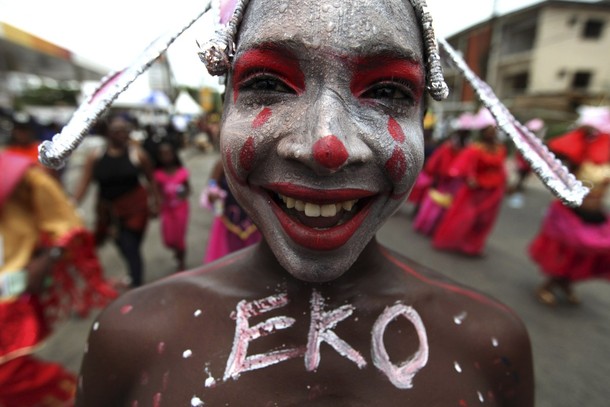This year, The Lagos Black Heritage festival, is set to run over 8 days from the 23rd of March until the 1st of April. The theme for this years’ festival is “The African Colours of Brazil”.
The award-winning Thobias de Vai Vai Samba group officially launched the theme in December last year with an inspired performance at Freedom Park. This marked the start of a season which will showcase dance, performance, drama and poetry with lecture series and other celebrations.
Professor Wole Soyinka, a leading cultural advocate of bringing back Brasil’s roots home to Africa, closed the event, commending the good example of private public partnership in the sponsorship of the Brasilian group. He was visibly excited at the cultural cohesion of the Brazilian community in Lagos and the Sao Paolo Vai Vai Samba group. The ultimate reality symbolism came with the tears from the Brazilian group visiting the Slave port of Badagry, off Lagos and the noisy African religious ceremony bonding the Brazilian community in Lagos with the visiting Brazilian samba group.

Although the government of Lagos State which is as rich as the country of Kenya – is the anchor partner of this cultural initiative given its legacy Brazilian community and Portuguese roots exemplified by its name; there is an exemplary tradition of private public partnership that encourages private sector support for this ground breaking African-Brazilian cultural heritage exchange. The Bring Brazil Back to Lagos Samba event’s key sponsors were – Trico Capital International Limited (TCIL) and its partners OCIC through the Sao Paolo Vai Vai Samba group underlining performance to usher in the festival. Trico is normally involved with sourcing investment for infrastructure projects – but we were much obliged to contribute to these milestone initiatives celebrating Black heritage. Brazil has actively involved itself in promoting the Nigerian cultural traditions of the Yoruba, now is our chance to in turn actively promote our Brazilian links. Herein lies an opportunity to improve our economies on a larger scale through taking an active role in recognizing and nurturing these links that may in turn have a positive impact on tourism business and drive Brasil –Nigeria economic collaboration.
With regards to tourism, Nigeria is slowly becoming a more tourism friendly country with other attractions such as Obudu Mountain resort, Calabar festival, Nekede Zoo, Yankari Park and NOK village pulling in foreign visitors. Hopefully the Lagos carnival will soon become one of the attractions which bring in tourists from all ends of the world.
However, in order for tourism to start playing a major role as a revenue generator, adequate steps need to be taken to improve the infrastructure and security needed for the industry to thrive. Improvements in infrastructure are not solely essential for the good of the citizens, they also act as drivers for change in investment and tourism levels in the entire nation.
On the economic front, plans have already been announced for Nigeria and Brazil to improve their trade relations. The volume of trade stood at $9 billion at the end of 2012, with Brazil being the third largest trading partner for crude oil exports. There now exists an initiative to double our bilateral trade volume by 2015, with a focus on building up more direct link between the countries, especially regarding aviation, as there are no direct flights between the two countries. This would act as a huge trade facilitator, greatly increasing investment and business relations between the two countries. It is essential that this happens in the very near future. Brazilian Investors are keen to invest in the Nigerian market and there is a lot of help that can be received from Brazil in order to bring to fruition the aims and objectives of the Nigerian Industrial Revolution plan.
This years’ festival event calendar promises an exciting collection of activities for Lagos state which aim to “animate the past, celebrate the present, and illuminate the future” as described by the event coordinators. Homage will be paid to Abdias de Nascimento, an inspiring Afro-Brazilian scholar, revolutionary, artist and politician with ties to Nigeria. He was an active partaker in the international pan- African movement and a leader in Brazil’s black movement. Sortilage, a play written by Nascimento will be shown on stage for the first time in West Africa. Nascimento was elected for a Nobel Peace Prize in 2004.
The Lagos government will still sponsor the festival in the future, but the availability of a number of corporate sponsorship partners will ensure its continued success. Hopefully, the necessary funding need to ensure its continued survival will not cease and the festival will become an integral part of a growing cultural calendar for Lagos State.
Trico Capital International’s CEO, Austine Ometoruwa, is on a mission to improve the infrastructure problems that are rampant throughout the continent without having to resort to increased dependency on European and world banks. With more than 40% of the total population living on less than a dollar per day, poverty is still a serious issue in most African countries. Over half a billion people in Africa are forced to live without electricity or other modern forms of energy whatsoever, and the lack of basic infrastructure has affected the trade of these African nations adversely.
Written By: Sunday Okonkwo has always been interested in infrastructure development and has watched as the exploitation of Nigeria’s natural resources has enabled it to grow. After studying Philosophy, Politics and Economics in London, he has gone on to a career within international development non-profit organisations and writes regularly on Africa’s continuing economic development closely follows the work of Austine Ometoruwa CEO of Trico capital focusing on the long term gains in economic development that comes with improved infrastructure developments.

